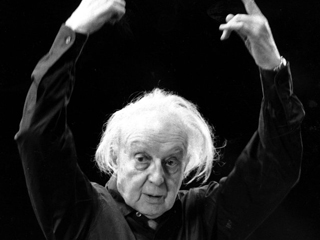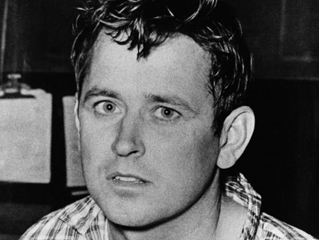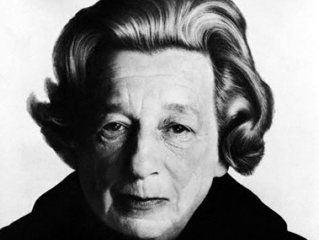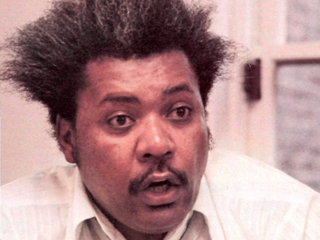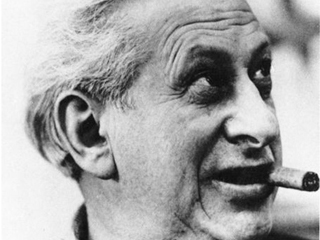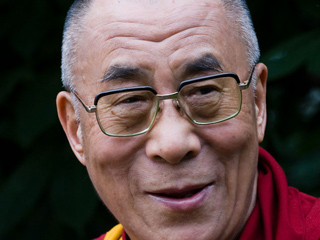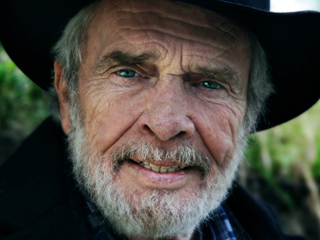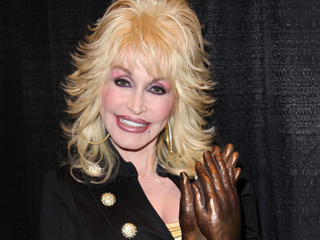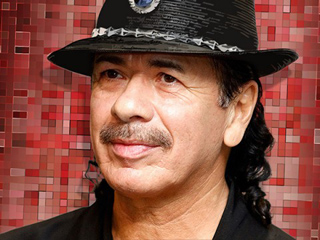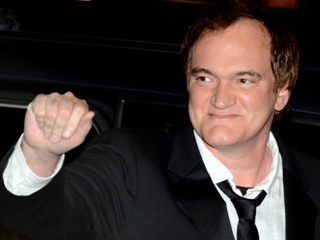Dan rather interviewed throughout his career influential cultural figures. He sat with musicians across all genres, from Merle Haggard to guitarist Jack White and jazz legends Lena Horne and Count Basie. From the film and television world, he interviewed writers, actors, and directors, including Oliver Stone and actors/activists Robert Redford as well as writers such as John LeCarre and Lillian Hellman. Rather also talked to sports personalities including boxing promoter Don King and basketball coach Bobby Knight. He interviewed inspiring figures such as the Dalai Lama, as well as notorious ones, such as James Earl Ray, the assassin of Dr. Martin Luther King Jr.
See Cultural Figures Interviews Additional Materials
Leopold Stokowski
For the premiere of the new CBS interview show Who's Who in January 1977, Rather sat with ninety-four-year old-Leopold Stokowski. Although he had been conducting since 1894 and had been the director of the Philadelphia Orchestra since 1912, Stokowski gained broad recognition when he "appeared" in the 1940 Disney film Fantasia. He also directed major pieces for the film, such as Bach's Toccata and Fugue in D Minor, Beethoven's "Pastoral" Symphony, Mussorgsky's Night on Bald Mountain, and Stravinsky's Rite of Spring. Although it enraged some critics, Stokowski was willing to lend his talents to promote classical music to millions.
Born and raised in London, Stokowski had created his own persona, playing an act, complete with East European accent, halo of air, and exaggerated gestures. Talking to Rather in London during the recording of the First Symphonie by Sibelius, the conductor explained that he had a mental disease: he was egocentric. Asked if egocentrism was the force that had kept his ambitions so prominent, Stokowski responded "no," explaining that he had tried the opposite and had found it boring. Fellow conductors and critics commented on the stunning performance of the ninety-four-year-old who still "carries" the orchestra. While disparaged after his death, Stokowski's career has been reassessed, and he is now recognized as the father of modern orchestra standards.
Materials
James Earl Ray
On April 4, 1968, civil rights leader Martin Luther King Jr. was shot in Memphis. Evidence pointed to James Earl Ray, a drifter known for his hatred of blacks who had been in and out of prison since 1949. In 1959, he was sentenced to twenty years for robbery but escaped the Missouri State Penitentiary in 1967. After the assassination of Dr. King, Ray fled to London, where he was captured by Scotland Yard. On March 10, 1969, he entered a guilty plea to avoid the death penalty and received a ninety-nine-year sentence. He immediately recanted his plea deal and spent the the next twenty-five years, until his death in 1998, asking for a new trial and maintaining that he had just been a decoy in a vast conspiracy to kill Dr. King; a theory the King family itself embraced.
In his interview with Rather in March 1977, James Earl Ray spoke of the mysterious Raoul, who supposedly financed his travels and bought him the gun that killed Dr. King. He explained that he entered the plea deal under pressure from his lawyer Percy Foreman. After yet another prison escape attempt in the summer of 1977, Ray testified in 1978 before the United States House of Representatives Select Committee on Assassinations (HSCA), which concluded that King was killed by one rifle shot from Ray and that "there is a likelihood" that it was the result of a conspiracy; one involving Ray and his brothers and no U.S. government agency. As the New York Times explained when Ray passed at the age of seventy in 1998, a book by Gerald Posner concluded that Ray murdered Dr. King and that there was no evidence of a conspiracy.
Materials
Lillian Hellman
A prolific writer of hit plays and movies like In Days to Come (1936) and The Little Foxes (1939), the controversial Lillian Hellman sat with Dan Rather in March 1977 as her new memoir, Scoundrel Time, came out and an adaption with Jane Fonda was in the making. They talked about her early success with movies such the anti-fascist Watch on the Rhine (1941) and The Searching Wind (1943), her relationship with Dashiell Hammett, why she posed for a mink advertisement, and how her career came to a halt during the McCarthy era when she was blacklisted for her leftist activism. In 1952, she read a letter to the House Un-American Activities Committee explaining that "I cannot, and will not, cut my conscience to fit this year's fashion." Hellman remembers how someone in the audience shouted, "Thank God, someone finally had the guts to do it!"—a gesture that helped her immensely in that moment. As director William Wyler remembered, Hellman could not find work in Hollywood for almost a decade. Finally, in 1962, Wyler adapted her play The Children's Hour for the screen. As she prepared to play her in the upcoming film Julia, Jane Fonda talked about what a complex person Hellman was, full of contradictions.
Materials
Don King
Producer Steve Glauber recalls the puff piece he and Rather were working on about the boxing manager Don King, who represented, among others, Muhammad Ali, turned into a much bigger story they expected. As Sports Illustrated summarized it: "fighters had to pay kickbacks to get into King's ballyhooed tournament, which ABC had underwritten to the tune of $1.5 million; that the records of at least 11 of the 60-odd boxers had been phonied in the 1977 Ring Record Book (the so-called Bible of Boxing); and that ratings supplied by Associate Editor John Ort of the Ring magazine had been rigged." It appeared that Don King was paying a fee to Ring magazine for its work on the tournament he organized, and that King also paid the expenses of John Ort, one of the members of an independent commission to oversee the tournament. Although it was illegal in many states and altogether unethical, evidence abounded that Don King and Ring magazine had very close relationships with boxers and had a stake in their ratings.
By happenstance, the CBS crew caught on camera a fight between the boxers Johnny Boudreaux, managed by Patty Flood, who in turn was Don King's adviser, and Scott LeDoux, managed by Joe Daskiewitz, both outsiders to the King's network. After the judge declared Boudreaux the winner, LeDoux denounced the whole operation. Rather interviewed Roone Arledge, president of ABC Sports, and connected him on the phone with a boxer who confirmed that he had to kick back as much as 40 percent of his money to get into the tournament. As a result, ABC hired Michael Armstrong, the New York lawyer who broke open the Serpico case, to conduct an independent investigation into what the network called "irregularities and possible corruption." The United States Boxing Championships was suspended as investigation continued.
Materials
Bobby Knight
In 1980, Dan Rather did a piece about the successful but controversial Indiana basketball coach Bobby Knight. Charged with socking a cop and sparking an international incident at the previous Pan American Games, Knight turned his Indiana University team into a national contender. Despite his success since coaching West Point at age twenty-four, including the perfection and popularization of the "motion defense," Knight was praised and criticized for his tough attitude with his players. He made sure that players succeeded academically and demanded total commitment, emphasizing that "the will to prepare to win" was more important than the will to win. Sports Illustrated writer Curry Kirkpatrick explained how Knight's motivation by fear could bring both positive results and destroy impressionable players. Knight's temper, his belligerence for some, was directed at everyone from players and referees to the press and even the crowd when they were not yelling loudly enough.
The interview with Rather was made easier after the two men played a bit of basketball as a way of ice-breaker. Producer Steve Glauber recalled how the shooting was nevertheless difficult with Knight acting as a bully and being physically aggressive. Controversies about Knight's physical abuses led to his dismissal from Indiana University in 2000. He then worked as head coach at Texas Tech until 2008 when he, after his nine hundredth win, handed the job to his son Pat Knight.
Materials
Studs Terkel
In the fall of 1980, Rather traveled to Chicago to sit with author, actor, radio host, and activist Studs Terkel for a 60 Minutes piece. Blacklisted during the McCarthy area, Terkel was already well-known for his work on television, with his show Stud's Place and his own radio show at WFMT, a mix of conversations and folk and jazz music, when he wrote his first best-selling book, Division Street: America, in 1967 at age fifty-five. Terkel followed with Hard Times, in 1970 about his recollections of the Depression-era, and Working in 1974 about the lives of ordinary working people. In 1985, his remembrance of World War II entitled The Good War earned him a Pulitzer Prize. With Rather, Terkel talked about the people he liked to interview for his radio show and about his latest book American Dreams, Lost and Found, a collection of about a hundred oral histories.
On his way to interview Terkel, Rather was caught in a bizarre incident. When the CBS journalist took a cab to get to Terkel's place, the driver started to use abusive language and refused to go to the specific address, speeding instead through the street up to 80 miles per hour. Rather opened the window and called for help until two motorists managed to force the cab to a halt. The driver was booked for disorderly conduct. The story became news, with conflicting versions of what had happened.
Materials
Dalai Lama
An independent empire since the seventh century, Tibet has had a complicated relationship with its powerful neighbor China, which invaded Tibet in 1950. An agreement was signed, and Tibet became a "national autonomous region" but suffered from the brutal control of Communist China, especially its anti-religious legislation. A Tibetan uprising broke out in 1959 and the fourteenth Dalai Lama, fearing abduction or worse, fled to India, where he established a democratically based shadow government.
In 2007, the Dan Rather Reports team traveled to Dharamsala, India, home of Tibet's government-in-exile, to visit His Holiness the Dalai Lama. The political and spiritual leader of Tibet, a man who calls himself "just a simple monk," talked about how the Chinese lack the moral authority to become a superpower. He advocated for what he called "meaningful autonomy" for Tibet with some form of self-rule. But even his talks of gradual change and smooth transition are considered a threat by Chinese authorities, and some Tibetans are frustrated with the slow approach. They hoped to get leverage from the Beijing Olympics.
The Dan Rather Reports team talked to refugees who took on a difficult and dangerous journey across the Himalayas to get to Dharamsala, escaping Chinese oppression, where one can be sent to prison for owning a picture of the Dalai Lama, in the hopes of getting a Tibetan education and exercising their religion freely.
Materials
Merle Haggard
Considered one of the most influential singer-songwriters in country music history, together with Hank Williams, Merle Haggard sat with Rather for a rare one-on-one interview in 2015 for the Big Interview on AXS TV. A string of rebellious acts and foray into crime in his youth landed him in San Quentin prison in 1957. He attended a performance by Johnny Cash and decided to turn his life around and play music. After honing his skills on the Bakersfield club circuit, Haggard recorded his first album, Strangers, in 1965. More than seventy featured albums followed, ranging from honky tonk, blues, jazz, pop, and folk, with close to forty number-one hits. Haggard won all major awards, including an induction into the Country Hall of Fame in 1994, a Grammy Lifetime Achievement in 2006, and a Kennedy Center Honor in 2010.
Haggard looked back at his youth of truancy, recalling the profound change he went through when he landed in prison. He talked about the Bakersfield sound, a raw-edged style that originated in the Californian working-class city, populated by the descendants of Okies. Popularized by Haggard and Buck Owens, the sound was built on western swing and honky tonk, adding electric instrumentation and backbeat, and the songs talk about the common men. Haggard talked about touring with Bob Dylan and Willie Nelson, how “Mamma Tried” might be his favorite song, and his ambivalent relationship to “Okie from Muskogee.” The musician passed away in 2016, and Rather celebrated him together with Prince, Natalie Cole, B. B. King, and David Bowie in a special “The Big Interview—Special Edition: Legends Lost," which aired in June 2016.
Materials
Dolly Parton
A fan of country music himself, Rather talked to numerous musicians and singers such as Linda Ronstadt, Charlie Daniels, Wynonna Judd, Florida Georgia Line, Loretta Lynn, and Emmylou Harris. He also hosted a special on the gospel music of Johnny Cash in 2007. He interviewed musical icon Dolly Parton, who sold over 100 million albums, earned 8 Grammy awards, and 26 number-one hits, several times in her career. In a 1997 special about the Smoky Mountains National Park, "Unspoiled Country," Rather talked to the Tennessee native who often sang about her birth state. The singer opened her elaborate Dollywood theme park in 1986, just outside the park's boundaries, and she even became an honorary international ambassador for the parks in 2008.
The two met again in 2014 for a one-hour interview.They chatted about Parton's new album, Blue Smoke, and her process for writing songs, more than three thousand so far, many of them recorded by other artists. Parton, for example, refused to give Elvis the rights to record "I Will Love Always Love You" and was impressed by Whitney Houston's version. Inspired by a father, Parton is a shrewd businesswoman who oversees an expanding Dollywood empire with nearly four million visitors in 2013. Her success is rooted in the relationships she formed over the years: her husband and her best friend Judy, as well as the professional partnerships she built such as with Kenny Rogers and Willie Nelson. Parton is also a philanthropist whose program, the Imagination Library, had provided over 50 million books to children in 2014. She is one of Rather's favorite and most entertaining interviewees.
Materials
Carlos Santana
Interested in all genres of music, Rather talked to numerous musicians and singers for The Big Interview, including The Who's Roger Daltey, Melissa Etheridge, Crosby, Stills & Nash, Aaron Neville and Trombone Shorty, Jack White, Gene Simmons, Heart, Lindsey Buckingham, Pat Benatar and Neil Giraldo, Annie Lennox, Patti LaBelle, and Gregg Allman. In January 2015, Rather interviewed rock 'n' roll pioneer Carlos Santana. The Mexican American guitarist and his band first experienced success in San Francisco in the late 1960s with a groundbreaking Afro-Latin-blues-rock fusion sound A forty-plus-years career followed with more than 100 millions albums sold, 10 Grammy Awards, and an induction into the Rock and Roll Hall of Fame in 1998. A recipient of the 2013 Kennedy Center Honors Award, Carlos Santana is regarded as one of the best, most innovative guitar players in the world, collaborating with the finest musicians from Herbie Hancock to Willie Nelson, and experimenting with all musical genres, from jazz and blues to funk and hip-hop.
Before a concert in the Las Vegas House of Blues, Santana talked about coming to California as a teen, about his first break at the famed Filmore West, and what it was like to play at the Woodstock festival, a performance that earned him praise from Jimi Hendrix. He explained how he is grateful to play for people "thirsty for spiritual romance." The guitarist talked about mentoring other artists, the birth of creativity, and how divorcing his wife after thirty-four years of marriage was the darkest moment of his life.
Materials
Quentin Tarantino
In addition to musicians, Rather interviewed film and television personalities, from writers (Aaron Sorkin, David Simon, and Paul Haggis) to actors (from Benicio Del Toro, Edward Norton, Carol Burnett, and Alan Alda to Janet Lynch) and directors such as Oliver Stone. In 2015, he sat with Quentin Tarantino to talk about his latest film, The Hateful Eight, his eighth film after Reservoir Dogs (1992), Pulp Fiction (1994), Jackie Brown (1997), Kill Bill Volumes 1 and 2 (2003–2004), Inglorious Basterds (2009), and Django Unchained (2012). Tarantino also wrote the screenplays for a handful of others (including True Romance in 1993, Natural Born Killers in 1994, and From Dusk till Dawn in 1996) and collaborated on a few others (co-director for Grindhouse with Rodriguez in 2007, producer for Hostel in 2005, as well as a series of foreign films). Since his breakthrough with Reservoir Dogs in 1992, the American filmmaker, screenwriter, and actor quickly developed a cult following for his provocative style of filmmaking from his non-linear storylines to his unforgettable characters. Despite the criticism of his aestheticization of violence, Tarantino has garnered both critical and commercial success, and he is regarded as one of the greatest directors.
With Rather, Tarantino talked about his passion for cinema and why he shot The Hateful Eight in 65 mm and showed it in 70 mm. He explained how the film, which deals with the resentment and feelings between parties in the wake of a brutal war and how it was directly related to the discussions about the Confederate flag in South Carolina. While he loves all kind of westerns, from the John Wayne and John Ford movies to the "spaghetti westerns" and the postmodernist westerns of the 1970s, Tarantino talked about how he had to create his own genre and style of western, one that will appeal to and reflect the 2000s. With all the film genres he worked with, from World War II to martial arts revenge film, Tarantino tried to elevate the genre by giving it some depth with subject matters such as the Holocaust and especially slavery, as he is fascinated by issues of race in America.
Materials
Willie Nelson
Born in Texas in 1933, country singer, songwriter, actor, and activist Willie Nelson rose to prominence in the 1960s. After moving to Austin, Texas, in 1972, he signed with Atlantic Records and turned to the "outlaw country" subgenre, which challenged the conservatism of Nashville. He later explored genres such as reggae, blues, jazz, and folk. Nelson also acted in over thirty films, co-authored several books, and was been involved in activism for the use of biofuels, farmers and the Farm Aid concerts, and the legalization of marijuana—as his own use led to trouble with the law a few times. During his lengthy, award-winning career, the American icon has written some of the most popular and memorable country songs of all time, many of which have been covered by a wide range of artists over the last half century.
Rather interviewed his fellow Texan several times during their sixty-plus-year careers, more recently in January 2016 for The Big Interview. Sitting in the kitchen of his tour bus “The Honeysuckle Rose,” which runs on biofuel, Nelson talks about his recent surgery, the songs he is working on, and his own brand of marijuana—“Willie’s Reserve,” grown in Colorado. He looked back at some of the worst things (the death of his son and troubles with the IRS) and the best things ever to happen to him (his family and being able to continue doing what he likes everyday). Inspired by the recent Gershwin Prize he received, Nelson was working on a new album, Summertime, his unique rendition of eleven Gershwin classics, and he just released a memoir, It’s a Long Story, My Life.


